US Envoy Slammed For Wearing Hijab In Meeting With Hezbollah Supporters
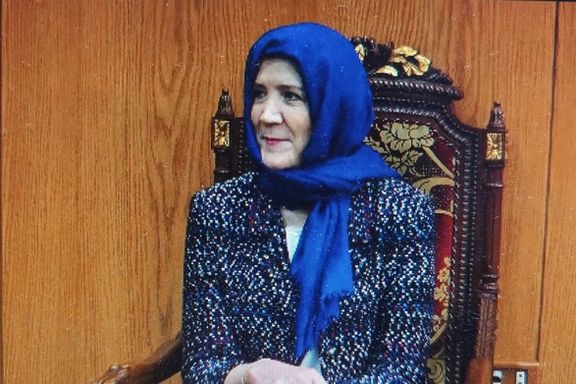
Critics say the US ambassador in Lebanon was wrong to wear a headscarf in a meeting with Hezbollah supporters and her move weakens US support for protesting women in Iran.

Critics say the US ambassador in Lebanon was wrong to wear a headscarf in a meeting with Hezbollah supporters and her move weakens US support for protesting women in Iran.
Lebanese media have recently published a photo of Dorothy Shea wearing hijab during a meeting with Lebanon’s Higher Shia Islamic Council members.
One senior diplomatic source told the Washington Free Beacon that the act undermines Washington’s efforts to support Iranian protesters who are against the clerical regime.
Hezbollah is backed by Iranian regime to expand its military and ideological influence in the region.
The images raised eyebrows among some officials in the State Department. Iranian-American groups have also expressed shock over the photos of the US diplomat in a headscarf.
“What message does this send to them in this unspoken, yet highly symbolic act of submission by a US ambassador who takes on the very appearance of the oppressors? I understand that as diplomats we are supposed to be sensitive to the culture in which we work, but sometimes, events take priority,” a senior State Department official told Washington Free Beacon.
“Shame on Shea for wearing a headscarf at Lebanon's request—who we all know take their orders from Tehran as Iranian women are being killed for their courageous actions of saying no to mandatory hijab," Bryan Leib, executive director of advocacy group Iranian-Americans for Liberty, told Washington Free Beacon.
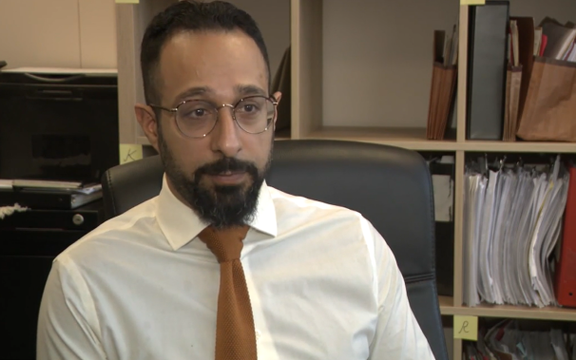
A group of Canadian, US and Iranian lawyers have launched a campaign to identify and take action against IRGC members and their affiliates living in Canada.
They have created a website called stopirgc.com to receive citizen reports and submit cases to government agencies and police to take action.
The Islamic Revolution Guard Corps or IRGC is the main branch of the Iranian military that defends the regime. It also controls most of the country’s military assets, including nuclear and missile programs.
Ramin Joubin, a Burnaby-based lawyer says over 100 cases in Canada are being investigated by the group.
“There are a lot of reports on family members of heads of state, or people who are high up in the current regime in Iran,” Joubin told Global News.
“They might be visiting, they might have a business, property, permanent residence or citizenship,” he added.
According to Joubin, they are also investigating cases of suspected money laundering, either from companies or individuals.
“A lot of the reports we’ve received are about business activities in Canada, but somehow bypassing sanctions and engaging in various types of money laundering.” said Joubin. “That is the biggest activity we are seeing by IRGC members and affiliates.”
In October, Ottawa barred some 10,000 IRGC members from entering Canada for life, as protests swept Iran following the death of Mahsa Amini in police custody.
Joubin, however, said the lifelong ban does not address IRGC officials, their affiliates and close family members, who already live inside the country.

Iran’s foreign minister claims that the West accuses Tehran of supplying drones to Russia to use against Ukraine, because it wants to “legitimize” its military assistance to Kiev.
In a phone conversation with UN Secretary-General Antonio Guterres, Hossein Amir-Abdollahian said that NATO’s decision to expand eastward was wrong and that was the root cause of the Ukraine war.
However, it is not clear from Iranian media reporting how Guterres reacted to the Iranian minister’s comments and in what context he made those comments.
Earlier, Amir-Abdollahian had acknowledged that Tehran “sold very few Iranian drones in the framework of defense cooperation with Russia 11 months before the start of the Ukraine war.”
He also warned that that Tehran believes diplomacy and dialogue are the best option, but the Islamic Republic will never be “tight-handed regarding other options.”
Russia has been using Iranian drones and missiles in its air attacks against Ukraine. In October, it targeted Ukraine’s civilian energy infrastructure, plunging it into blackouts as the winter cold began.
Amid international outcry over the Islamic Republic’s supply of drones and ballistic missiles for the Russian invasion, Ukrainian President Volodymyr Zelenskiy told a meeting of UN security council November 23, that the attacks are “an obvious crime against humanity” adding that Kyiv would put forward a resolution condemning “any forms of energy terror”.
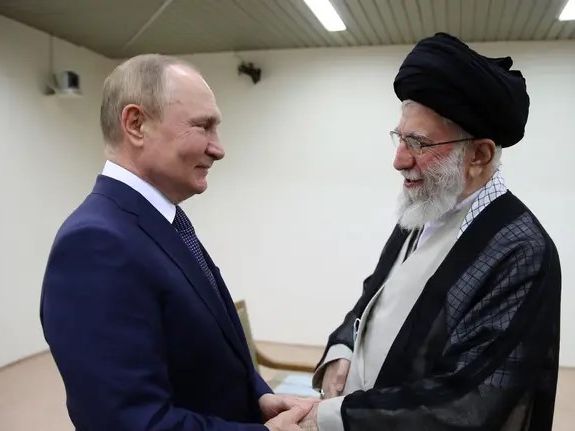
The Islamic Republic has asked Russia for help to quell the popular uprising by supplying anti-riot equipment and training, Iran International has learned.
The Iranian regime has asked Moscow to dispatch advisors as it is preparing for a long-term confrontation with protesters and concerned about its limited resources both in manpower and equipment.
Secret files recently obtained by hackers and shared with Iran International also shows that Tehran is relying on information from Moscow to assess its own internal situation. There are references in the documents that Russia is eavesdropping on Western communications to give Tehran assessments about the nature and strength of the protest movement.
The new information about Tehran asking Moscow’s help confirmed remarks late in October by the White House that Russia may be advising Tehran on optimal methods to suppress the ongoing protests.
White House press secretary Karine Jean-Pierre said during a joint press briefing with Coordinator for Strategic Communications at the National Security Council in the White House John Kirby that Moscow may be helping the Islamic Republic, drawing on its own experience in suppressing demonstrations.
"The evidence that Iran is helping Russia rage its war against Ukraine is clear and it is public. Iran and Russia are growing closer the more isolated they become," Jean-Pierre said. "Our message to Iran is very, very clear: Stop killing your people and stop sending weapons to Russia to kill Ukrainians."

Kirby said that the White House is certain about Russia’s help in the crackdown on protesters, adding that it is not an allegation but a fact. “We know they may be considering some sort of support to Iran’s ability to crack down on protesters. And sadly, Russia has experience at doing that,” he said.
Kirby called it “just yet another example of Russia and Iran now working together to violate the — not only the human rights and civil rights of people in Iran but, of course, put in further danger the lives of Ukrainians.”
The growing outcry against Iran’s brutal crackdown on anti-government protests ignited by the beating to death of Mahsa Amini that has led to about 470 other killings has now been magnified by the Islamic Republic’s tilt toward Russia and arms support for its invasion of Ukraine.
It has already caused a policy shift in Washington as the Biden administration has said that the revival of the 2015 Joint Comprehensive Plan of Action (JCPOA) is not a priority at present and that the US focus is on the protests in Iran. US Special Envoy for Iran Robert Malley said earlier in the week that President Joe Biden is prepared for a military option to prevent Iran from acquiring a nuclear weapon in case sanctions and diplomacy fail.
A senior Revolutionary Guard commander Saturday told Iran International that the IRGC's chief commanders have called up 1,000 retired members to help quell the popular uprising as they don't have enough forces, but only 300 accepted to return to service and crack down on protests.
Earlier in the week, an audio file obtained by the hacktivist group, Black Reward, revealed concerns among Iranian officials about their worn-out security forces, media failures and labor strikes.
Black Reward found access to Fars News Agency’s data servers in recent days providing Iran International with an audio tape of a meeting between a Revolutionary Guard general and a group of media managers or representatives from outfits affiliated with the IRGC.
About 18,000 people have been arrested since the beginning of the protests, and some death sentences have already been issued for the protesters, though none have been carried out. According to Norway-based HRANA on December 2, 469 protestors and 61 members of the security forces have been killed in protests since September 17.
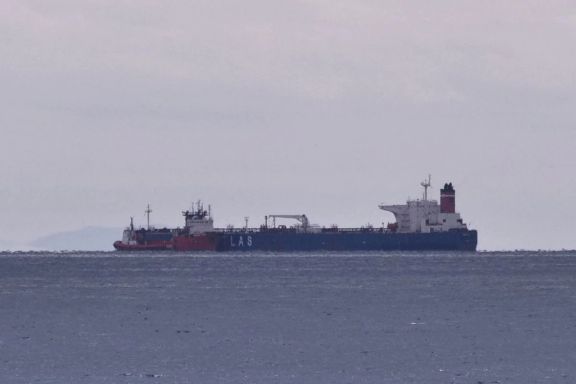
An Iranian-flagged tanker, which the US had previously confiscated around Greece, has unloaded its oil cargo in Syria.
A ship tracker said on Friday that Lana delivered an oil shipment of around 700,000 barrels in the Syrian port of Banias, ending months of uncertainty about the cargo.
The seizure from the Lana prompted Iranian forces in May to seize two Greek tankers in the Persian Gulf which were released on November 16.
Claire Jungman, the chief of staff with US advocacy group United Against Nuclear Iran (UANI), which monitors Iran-related tanker traffic through ship and satellite tracking, said Iran's shipments to Damascus "are regarded as a way of strengthening the country's regional position and are also a major part of the regime's survival strategy".
The Lana's last reported position on November 20 was anchored off Syria's coast, according to ship tracking on Eikon. The ship, previously called Pegas and renamed Lana in March, had reported an engine problem in April. It was headed to the southern Peloponnese peninsula to offload its cargo on to another tanker but rough seas forced it to moor just off Karystos where it was seized, according to the Athens News Agency.
Syria is undergoing severe fuel rationing as a response to shortages, leading to rolling cuts in the electricity and telecoms sectors. According to UANI analysis, Syria received 1.39 million barrels in shipments from Iran in November, down from 3.5 million barrels in October and 3.7 million barrels in September.
For over two months, the Lana remained under arrest off the Greek island of Evia. It was tugged to Piraeus following court orders that allowed its release.
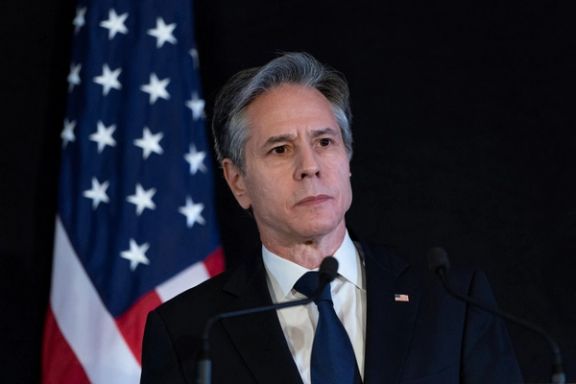
The United States on Friday designated China, Iran and Russia, among others, as countries of particular concern under the Religious Freedom Act over severe violations.
US Secretary of State Antony Blinken in a statement said those designated as countries of particular concern - which also include North Korea and Myanmar - engaged in or tolerated severe violations of religious freedom.
"Around the world, governments and non-state actors harass, threaten, jail, and even kill individuals on account of their beliefs," Blinken said in the statement.
"The United States will not stand by in the face of these abuses."
He added that Washington would welcome the opportunity to meet with all governments to outline concrete steps for removal from the lists.
Washington has increased pressure on Iran over the brutal crackdown on protesters. Women have waved and burned headscarves - mandatory under Iran's conservative dress codes - during the demonstrations that mark one of the boldest challenges to the Islamic Republic since the 1979 revolution.
The United Nations says more than 300 people have been killed so far and 14,000 arrested in protests.
United Nations experts have also called on Iran to stop persecution and harassment of religious minorities and end the use of religion to curtail the exercise of fundamental rights.
The Baha’i community is among the most severely persecuted religious minorities in Iran, with a marked increase in arrests and targeting this year, part of what the UN experts called broader policy of targeting dissenting beliefs or religious practices, including Christian converts and atheists.
Reporting by Reuters